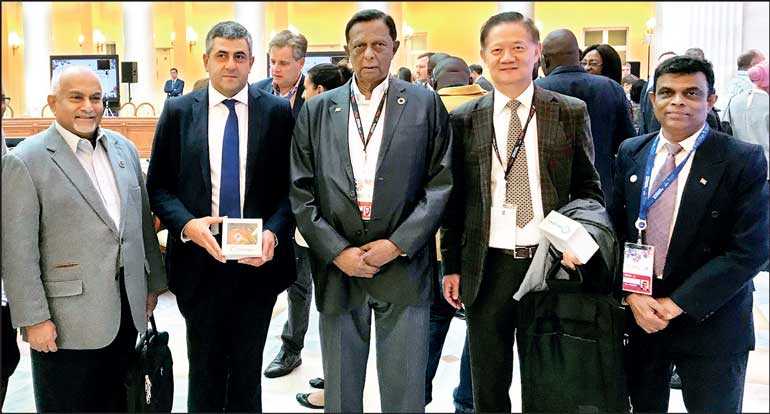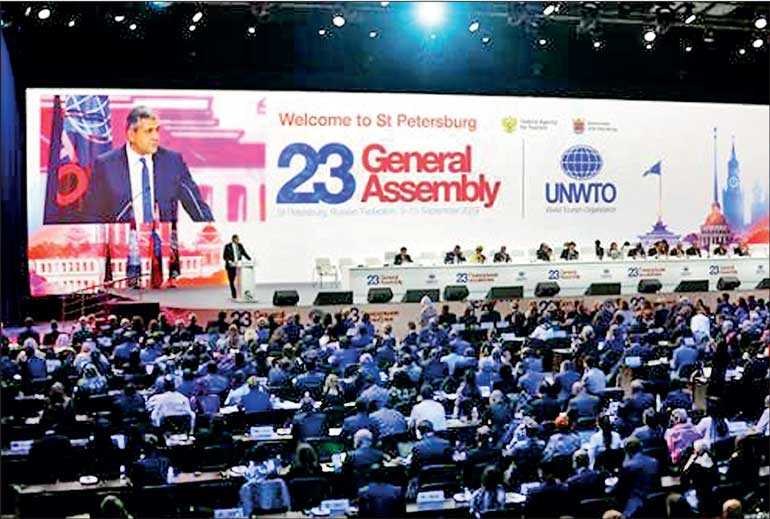Tuesday Feb 24, 2026
Tuesday Feb 24, 2026
Friday, 20 September 2019 00:00 - - {{hitsCtrl.values.hits}}


The 23rd Session of the General Assembly of the World Tourism Organization concluded on 13 September in St. Petersburg, Russia after three days of debate and discussion which saw 117 countries reaffirm their commitment to making global tourism more sustainable, more inclusive and more ethical.
More than 1,300 registered participants from around the world took part in the most important high-level meeting for the global tourism sector. As the first General Assembly held under Secretary-General Zurab Pololikashvili, the focus was on working to make the global tourism sector more sustainable and more accessible, along with a key driver of growth and employment through the embracing of entrepreneurship, innovation and education.
Sri Lanka which is a full member of the UNWTO was represented at the General Assembly by Minister of Tourism Development, Wildlife and Christian Religious Affairs John Amaratunga, Senior Advisor to the Minister Felix Rodrigo and Sri Lanka Tourism Development Authority Director General Upali Ratnayake.
Minister Amaratunga who held the position of Vice President – South Asia region for the last two years noted that Sri Lanka which has experienced both the ups and downs of tourism has the potential to be a case study for the global industry especially in the post Easter Sunday scenario where the recovery has been well ahead of projections.
The Report of the Secretary-General, presented on the first day of the assembly, outlined the progress made over the past year. Notable achievements outlined in St. Petersburg include UNWTO regaining its financial stability, allowing the organisation to deliver better value for its growing network of member states and affiliate members. A key highlight of the Report was the presentation of the UNWTO 2030 Agenda for Africa. The 10-point plan is aimed at growing the continent’s tourism sector and using it as a catalyst for economic and social development.
“This General Assembly has demonstrated that, globally, the tourism sector is ready to stand up and be counted as a leader in the Sustainable Development Agenda and in innovation,” said Secretary-General Pololikashvili. “If tourism is to fulfil its massive potential as a creator of jobs, driver of economic growth and catalyst of equality, then it needs to be open to all, and open to new ideas. As we have seen, countries around the world, along with leaders of the private sector, are ready to meet this challenge.”
Within the framework of the current UNWTO Year of Education, Skills and Jobs, Ministers and private sector leaders debated the role of tourism in creating jobs and training workers to fill the tourism jobs of tomorrow. In a significant step forward, UNWTO announced a new partnership with IE University in Madrid, the Online Tourism Academy. With the support of the State of Qatar, the Academy will allow tourism sector workers of all levels to enhance their skillsets for the jobs of tomorrow.
In another major step, member states unanimously agreed the adoption of the first-ever Global Convention on Tourism Ethics. The General Assembly also witnessed awarding of the first Accessible Tourism Destination (ATD) accolade in partnership with Spanish NGO ONCE. Portugal was named the most accessible tourist destination, while the cities of Barcelona and Thrissur in India were also recognised for steps taken to welcome differently abled tourists.
At the conclusion of the 23rd Session of the General Assembly, the Kingdom of Morocco was chosen as the host for the 24th Session through electronic voting which was introduced for the first time at a UNWTO General Assembly.